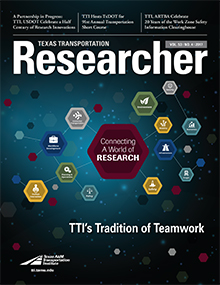For the past 50 years, the Texas A&M Transportation Institute (TTI) has provided assistance to the U.S. Department of Transportation (USDOT) to make the nation’s transportation system safer, more efficient and more resilient. Across the DOT’s spectrum of modal agencies—air, highways, motor carriers, rail, transit, maritime, traffic safety, and pipeline and hazardous materials—TTI expertise has helped the department conduct cutting-edge research to enhance the movement of people and goods. TTI’s efforts have helped improve the country’s global competitiveness, as well as provided real-world educational opportunities for university students.
“TTI has been at the forefront of many important research and technology transfer projects for FHWA over the years,” notes Michael Trentacoste, former Federal Highway Administration (FHWA) associate administrator for research, development and technology. “TTI researchers bring not only expertise, but creative and innovate problem-solving skills to their work.”
Federal Highway Administration

TTI participates or leads teams on numerous Indefinite Delivery Indefinite Quantity contracts and other projects supporting FHWA’s offices in the areas of managed lanes, active traffic management, pricing strategies, performance measures, highway safety visibility, safety data, and bicycle and pedestrian safety. TTI’s cutting-edge research efforts include leading the development of an infrastructure interface that enables communication of real-time traffic signals to connected vehicles (CVs). TTI also designed, developed and pilot tested an open-source integrated vehicle-to-infrastructure platform to facilitate the development and deployment of infrastructure-based CV applications.
Office of the Assistant Secretary for Research and Technology (OST-R)

TTI has been an integral part of the University Transportation Centers (UTCs) program since its creation in 1987. With The University of Texas and Texas Southern University, TTI led the Southwest Region University Transportation Center, which provided research, education and technology transfer activities from 1988 to 2016. TTI hosted the UTC for Mobility from 2006 to 2012, providing pioneering research — including enhancements to the Urban Mobility Report — and expanding academic collaborations across Texas A&M University. Currently, TTI leads the Center for Advancing Research in Transportation Emissions, Energy, and Health — which focuses on the nexus of human health and vehicle emissions — and is part of the Safety through Disruption UTC, which focuses on maximizing the safety benefits of disruptive technologies.
On the research side, the Institute was part of Battelle’s team conducting the National Evaluation of the Urban Partnership Agreements and Congestion Reduction Demonstrations for OST-R’s Intelligent Transportation Systems Joint Programs Office. Currently, TTI leads the National Evaluation of the Connected Vehicle Deployments in Tampa, New York City, and Wyoming, as well as the Columbus Smart City project.
U.S. Maritime Administration (MARAD)

TTI performed a study co-sponsored by MARAD and the National Waterways Foundation to verify industry assumptions about the benefits of the inland waterway system (specifically related to cargo capacity, congestion, emissions, energy efficiency, safety impacts, and infrastructure) compared to truck/rail systems. Published in 2007 and amended in 2009, the report (updated twice) continues to be well received and has been cited numerous times as the industry standard on this topic.
Federal Railroad Administration (FRA)

TTI has worked directly with FRA or via joint research initiatives with its USDOT sister agencies to advance rail-related research and practice. From identifying, assessing and testing advanced technologies to preparing rail-related reports for the U.S. Congress to developing guidance related to highway-rail grade crossing safety that underlies state rail safety agency efforts nationwide, TTI has proven itself an industry thought leader across the spectrum of rail research.
Federal Transit Administration (FTA)

FTA has invested billions of dollars in public transportation assets across the United States. Many of these assets are threatened by climate change and extreme weather-related issues, which place substantial operating and financial burdens on public transit agencies. In 2012, TTI led the Gulf Coast Climate Change Adaption Pilot Study for FTA to document adaptation strategies to minimize the impacts of severe weather events. The research, published by FTA in August 2013, proved prescient given the Gulf Coast hurricanes Harvey and Irma in 2017.
Federal Motor Carrier Safety Administration (FMCSA)

TTI has conducted various FMCSA-sponsored research projects, such as examining weigh-in motion needs of commercial motor-vehicles (CMVs) at the U.S.-Mexico border. Another recent study evaluated 2,800 CMV crashes in 20 Texas counties to provide operators and agencies with data to help identify risky CMV driving behaviors in the Lone Star State. In 2016, TTI’s Teens in the Driver Seat® program conducted its “Respect the Rig” outreach campaign aimed at improving teen driver safety around large vehicles.
National Highway Traffic Safety Administration (NHTSA)

TTI leads NHTSA-sponsored efforts in Texas to improve safety for youth drivers, motorcyclists, bicyclists, and pedestrians. The Institute conducts programs to reduce impaired driving and help law enforcement with data-driven approaches to crime and traffic safety, and documents behaviors in using seat belts, child passenger safety seats and cell phones. TTI has performed groundbreaking vehicle design and roadside safety research, investigated motivations for speeding, evaluated parent-taught driver education, and assessed driver-vehicle interface best practices and human factor considerations.

